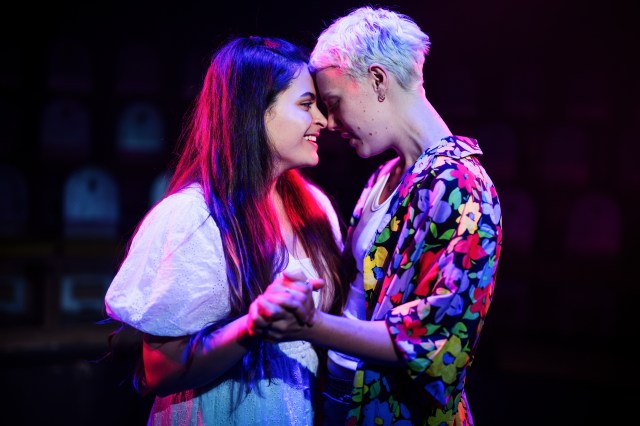Salty Irina at Edinburgh Festival Fringe – review
Eve Leigh’s queer coming-of-age love story with a political twist runs at Summerhall until 27 August

Normally when I write about a new play I’d start by summarising what happens in it, but that’s hard to do with Salty Irina because so much of it is kept anonymous. We’re never told the real names of the two lead characters, nor the precise location where the action unfolds: all we know is that it’s a city in a North-Eastern European country, sometime after the fall of Communism.
That very anonymity is a clever part of the play’s structure, however, because it pours the focus into the relationship between the two leads, which is the focal point of the action anyway. Yasemin Özdemir’s character arrives in the city for university and is unsettled by a series of murders in the local area which seem to be targeting shopkeepers from ethnic minorities. One morning she encounters a pool of blood outside her flat, and Hannah van der Westhuysen’s character turns up out of the blue to help her cope with the shock. Powerful feelings blossom between them and, as they don’t trust the police, they decide to take matters into their own hands and infiltrate a far-right festival on the edge of town to see if they can get to the bottom of who is responsible. The play’s title derives from the pseudonyms that they use to avoid being discovered.
So it’s right to describe it as “a queer coming-of-age love story”, but the element of politics stops it from becoming conventional. The story of their developing love unfolds alongside the story of the murders and the festival. The two narratives spiral around and through one another, enriching each other as they develop, but it’s always easy to follow thanks to the clarity of Eve Leigh’s script. The girls speak of one another in terms of vital immediacy that will remind anybody of the time they first fell in love, but the shadow of the political events means that a dark undertone always runs through, and the elements of danger increase as the play develops.
The tension boils over a little too much in the scene at the festival with the introduction of a third character played by Jana Francesca Knight. A game of Never Have I Ever develops jarringly quickly into a piece of Grand Guignol that shifts the tone rather too radically, and the ending that follows rapidly feels a little easy after the narrative skill of what had gone before.
However, the performances of the central leads are completely gripping throughout, and the show is rewarding for them alone. Van der Westhuysen’s character has an air of wide-eyed intensity and have-a-go courage throughout, while Özdemir’s character journeys between terror and bravery as well as self-discovery. They make the dialogue completely their own, and they perform it in a manner that’s both natural and completely believable. Debbie Hannan’s straightforward direction uses the in-the-round space of the Summerhall Roundabout effectively. It’s an intelligently written, skilfully constructed piece of theatre, and it kept me completely engaged throughout.















